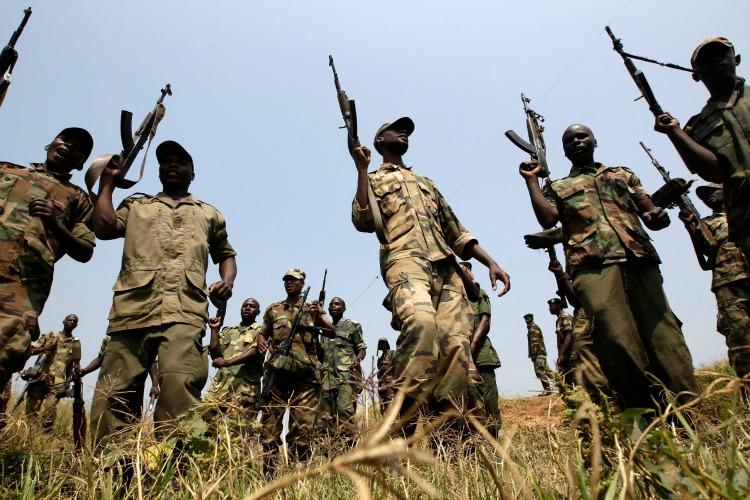Foreign News
DR Congo: 50 die following militia attack on IDPs camp – UN

No fewer than 50 people, including women and children, were killed in an attack on Tuesday night at a site for internally displaced people in Savo, Ituri Province, in the Democratic Republic of the Congo (DRC), the UN said on Wednesday.
According to the UN Mission in the country (MONUSCO), the attack was carried out by members of the so-called Cooperative for the Development of the Congo (CODECO) – a loose association of various Lendu militia groups.
The head of the mission, Bintou Keita, strongly condemned the attack, that also left 36 injured.
MONUSCO dispatched a patrol to the site upon receiving an alert about the attack. They also notified national security forces as well as its community alert network.
Briefing newsmen in New York, the Secretary-General’s Deputy Spokesperson, Farhan Haq, said that UN peacekeepers exchanged fire with the assailants shortly after arriving on the scene.
The blue helmets also conducted joint operations with the Congolese army into the early morning, pushing the assailants out of the area and securing the site to prevent further immediate attacks.
In the meantime, humanitarian partners have started providing medical supplies.
According to the spokesperson, humanitarian officials are reporting that access by road is restricted due to insecurity and the delivery of humanitarian assistance is challenged.
The area is home to 600,000 displaced people.
In a report issued last week, the UN Joint Human Rights Office (UNJHRO) said that 6,989 cases of human rights violations were documented last year in the country, down nearly 12 per cent from 2020.
Around 60 per cent of the violations were carried out by armed groups in provinces affected by armed conflict, where at least 2,024 civilians, including 439 women, were victims of summary executions.
Besides CODECO, other significant armed groups, often acting with total impunity, include the Allied Democratic Forces (ADF) and Mai Mai.
State agents, including the national army, police and other security agencies, accounted for 35 per cent of the violations, including the extrajudicial killings of least 40 civilians.
According to news reports, because of this violence, the government decided in 2021 to place the provinces of Ituri and North Kivu under a “state of siege”, a measure giving exceptional powers to the army and police.
With 19.6 million people in dire need of assistance, the country continues to witness one of the most complex and long-standing humanitarian crises in the world. (NAN)
Foreign News
Zelensky Announces New Draft Law on Anti-corruption Bodies after Protests

Ukrainian President Volodymyr Zelensky said he has approved the text of a draft law guaranteeing the freedom of two anti-corruption bodies in Ukraine – days after nationwide protests broke out over changes curbing their independence.
Kyiv’s Western partners had also expressed serious concerns over the legislation.
On Thursday, Zelensky seemed to backtrack, saying the new bill was intended to safeguard the independence of Ukraine’s National Anti-Corruption Bureau (Nabu) and Specialised Anti-Corruption Prosecutor’s Office (Sap), and to protect them from Russian influence.
He said the text of the bill was “balanced”, but did not provide any details.
The law passed earlier this week brought Nabu and Sap under the control of the prosecutor general, who is appointed by the president.
At the time Zelensky justified his decision to curtail the bodies’ powers by citing Russian influence. The day before, Ukraine’s security services had carried out searches and arrests targeting alleged Russian spies at the agency.
The passing of the legislation instantly sparked the largest protests since the start of Russia’s full-scale invasion in February 2022 in several cities across Ukraine, with many worrying the law would severely undermine the Nabu and Sap’s authority and effectiveness.
Thousands of people gathered in streets and squares across Ukraine, holding placards calling for the legislation to be vetoed.
Several commentators accused Zelensky of democratic backsliding. Their concerns were further exacerbated when Ukraine’s Western partners signalled their displeasure with the bill.
Ukraine has official EU candidate status and a spokesman for European Commission chief Ursula von der Leyen previously warned Kyiv that the rule of law and the fight against corruption were “core elements” of membership to the bloc.
On Thursday, the Commission said it “welcomed” the Ukrainian government’s decision to take action against the bill.
“We are working [with the Ukrainian government] to make sure that our concerns… are indeed taken into account,” the spokesman said.
Nabu and Sap were created in 2014-15 as one of the requirements set by the European Commission and International Monetary Fund to move towards a relaxation of visa restrictions between Ukraine and the EU.
Writing on Facebook, opposition MP Oleksiy Goncharenko noted Zelensky said that “the independence of anti-corruption institutions must be guaranteed.”
“First we take it away, and then we say that it must be guaranteed. So why was all this necessary?”
In his message on social media on Thursday, Zelensky did not acknowledge the protests or the backlash but said it was “important that we respect the position of all Ukrainians and are grateful to everyone who stands with Ukraine.”
Foreign News
US Senators Exempt HIV/Aids Funding from Planned Spending Cuts

Republicans in the US Senate have said they will spare the US-backed HIV/Aids programme Pepfar from cuts, amid a larger effort to reduce government spending.
Senators said they would end a plan to cut $400m (£300m) from the President’s Emergency Plan for Aids Relief programme, leaving total proposed cuts at $9bn.
The proposition was made in a Senate amendment to a rescissions package – meaning a bill that allows lawmakers to cancel previous funding approved by Congress.
The planned cancellations also include funds for international aid and public broadcasting.If the Pepfar amendment is approved, the bill will go back to the House of Representatives for another vote ahead of a Friday deadline.
Multiple senators from both parties had expressed concern with cuts to Pepfar, which was launched under President George W Bush and has been credited with saving tens of millions of lives around the world.
The Republican-controlled Senate can only afford a few defectors, assuming all Democrats vote in opposition. John Thune, the Republican Senate majority leader, said there had been a “lot of interest” in keeping the Pepfar funding intact.
Senator Susan Collins, a Republican from Maine, told reporters after a White House lunch on Tuesday that she was “very pleased” that the cuts would be removed.
Prior to the amendment, Collins had been vocal against the bill. She has not said whether the changes are enough to secure her support.
Office of Management and Budget (OMB) Director Russell Vought told reporters that the White House was on board with the Senate amendment, meaning that in its current form President Donald Trump would be willing to sign it.
In his second presidency, Trump has turbo-charged an effort to reduce government spending. Most of the cuts in the rescission bill are aimed at clawing back money that was previously earmarked for the American government’s main humanitarian assistance body, USAID, which recently announced its formal closure under Trump.
Trump’s moves have led to drastic reductions in HIV/Aids clinics in South Africa and other countries, precipitating a shortage of life-saving medicine and care.
Other cuts in the rescission bill are aimed at the funding for public broadcasters NPR and PBS.
Foreign News
WHO Commends Senegal for Eliminating Trachoma

The World Health Organization (WHO) has validated Senegal’s elimination of trachoma as a public health problem, making it the ninth country in WHO’s African Region to have achieved the feat.
WHO Director-General Tedros Ghebreyesus, in a statement, lauded the country for freeing its population of the disease.
“This milestone is yet another sign of the remarkable progress being made against neglected tropical diseases globally, and offers hope to other countries still working to eliminate trachoma.
”Trachoma has been known in Senegal since the early 1900s and was confirmed as a major cause of blindness through surveys in the 1980s and 1990s.
Senegal joined the WHO Alliance for the Global Elimination of Trachoma in 1998, conducted its first national survey in 2000, and completed full disease mapping by 2017 with support from the Global Trachoma Mapping Project and Tropical Data.
Trachoma control was consistently integrated into national eye health programmes – first under the National Programme for Blindness Prevention (PNLC) and later through the National Programme for the Promotion of Eye Health (PNPSO).
The country’s consistent integration of trachoma control into its national eye health programmes positioned it to significantly maintain its commitment to the elimination of the disease.
“Today we celebrate our victory against trachoma, 21 years after the one against dracunculiasis”, Dr Ibrahima Sy, Senegal’s Minister of Health and Social Action, said.
“This new milestone reminds us that our overarching goal remains a Senegal free from neglected tropical diseases.
“We are fully committed to this, and we are making good progress, notably against human African trypanosomiasis (sleeping sickness) and onchocerciasis”.
Senegal implemented the WHO-recommended SAFE strategy to eliminate trachoma with the support of partners, reaching 2.8 million people who needed them across 24 districts.
These activities included the provision of surgery to treat the late blinding stage of the disease and conducting antibiotic mass drug administration of azithromycin donated by Pfizer through the International Trachoma Initiative.
Similarly, public awareness campaigns were carried out to promote facial cleanliness and improvement in access to water supply and sanitation.
Trachoma is the second neglected tropical disease to be eliminated in Senegal. In 2004, the country was certified free of dracunculiasis (Guinea-worm disease) transmission.
Senegal now joins 24 other countries that have been validated by WHO for eliminating trachoma.
The 24 countries are Benin, Burundi, Cambodia, China, Gambia, Islamic Republic of Iran, Lao People’s Democratic Republic, Ghana, India, Iraq, Malawi, and Mali.
The others are Mauritania, Mexico, Morocco, Myanmar, Nepal, Oman, Pakistan, Papua New Guinea, Saudi Arabia, Togo, Vanuatu, and Vietnam.
These countries are part of a wider group of 57 countries that have eliminated one or more neglected tropical diseases.
WHO is supporting Senegal’s health authorities to closely monitor communities in which trachoma was previously endemic, to ensure there is no resurgence of the disease.
“Trachoma has cast a shadow over communities in Senegal for more than a century.
“This long-awaited validation is not only a milestone for public health but a powerful tribute to the tireless dedication of frontline health workers, communities, government leaders, and partners who never gave up,” Dr. Jean-Marie Vianny Yameogo, WHO Representative in Senegal, said.
“Today, we close a chapter that began over a hundred years ago, united with pride, gratitude and resolve. WHO remains committed to supporting Senegal as the country continues to lead in sustaining this hard-earned achievement.”
Trachoma remains a public health problem in 32 countries, with an estimated 103 million people living in areas requiring interventions against the disease.
Trachoma is found mainly in the poorest and most rural areas of Africa, Central and South America, Asia, the Western Pacific and the Middle East.
WHO’s African Region is disproportionately affected by trachoma, with 93 million people living in at-risk areas in April 2024, representing 90% of the global trachoma burden.
Significant progress has been made in the fight against trachoma over the past few years, and the number of people requiring antibiotic treatment for trachoma in the African Region fell by 96 million from 189 million in 2014 to 93 million as of April 2024, representing a 51 percent reduction.
There are currently 20 countries in WHO’s African Region that are known to require intervention for trachoma elimination.
They are Algeria, Angola, Burkina Faso, Cameroon, Central Africa Republic, Chad, Côte d’Ivoire, Democratic Republic of the Congo, Eritrea, Ethiopia, and Guinea.
The others are Kenya, Mozambique, Niger, Nigeria, South Sudan, the United Republic of Tanzania, Uganda, Zambia, and Zimbabwe.
A further 3 countries in the Region (Botswana, Guinea-Bissau and Namibia) claim to have achieved the prevalence targets for elimination.




















